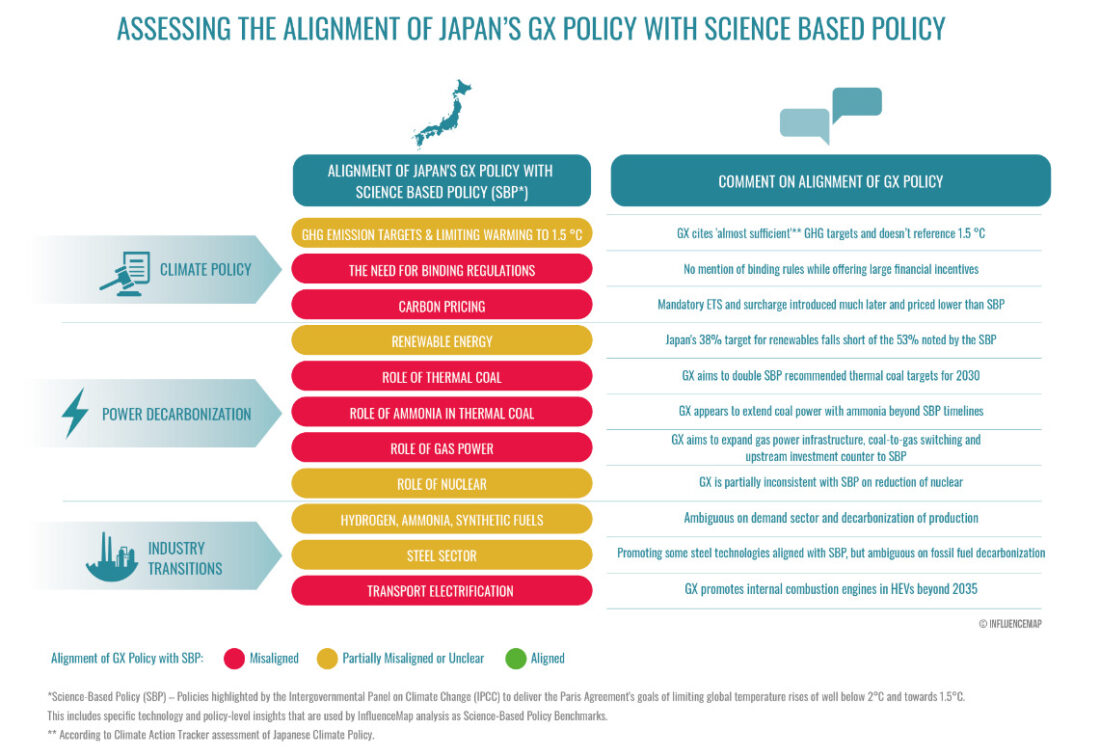UK-based think tank Influence Map has released a report that shows Japan’s Green Transformation (GX) Policy is significantly misaligned with the 1.5°C target.
The report, titled “Japan’s $1 Tn GX (Green Transformation) Policy: Does it Align with Science Based IPCC Recommendations and Who is Influencing It” compares Japan’s GX Policy to the Intergovernmental Panel on Climate Change (IPCC)’s guidance on pathways that can deliver the Paris Agreement’s goal of limiting global temperature rise to 1.5°C above pre-industrial levels.
From its analysis, Influence Map summarizes that the GX Policy significantly diverges from benchmarks, particularly in its “Carbon Pricing” system for carbon dioxide (CO2) emissions and in policies related to fossil fuels.
Key Findings (taken from Influence Map’s press release)
- The GX Policy indicates Japan’s 2030 and 2050 greenhouse gas (GHG) reduction targets but it does not mention how the GX Policy will contribute to or be consistent with the 1.5°C target.
- The “Pro-Growth Carbon Pricing” scheme, which combines a carbon levy and emission trading, is slow to be introduced and has unclear pricing levels. According to the IPCC, a price of about US$170-290 per t-CO2 will be required in 2030. The Pro-Growth Carbon Pricing scheme is unlikely to generate carbon pricing levels in-line with those outlined by the IPCC.
- The GX Policy’s reliance on coal, LNG, and hydrogen/ammonia co-fired power generation contradicts the IPCC’s 1.5°C recommended pathways and poses risks to long-term global emissions goals. Although it is partially aligned with Science Based Policy (SBP) in its support for offshore wind and solar energy, Japan’s 36-38% renewable target for 2030 is far lower than the average 53.6% share of the energy mix in IPCC modeled pathways.
- The GX Policy’s support for “electric vehicles” which includes hybrid vehicles is misaligned with Science Based Policy. IPCC guidance mentions that hybrid vehicles are representing only a “suitable temporary solution” and electric vehicles powered by low emission electricity will play a dominant role.

Influence Map also looked at the companies and organizations involved in the GX Policy, finding that the overwhelming majority of policy engagement (about 80%) originates from a small minority of nine industry associations and eight companies (e.g., electricity, steel, automobiles, fossil fuel production). Keidanren (Japan Business Federation) was the most actively involved, while other sectors (finance, retail, construction, consumer goods, healthcare, etc.), which constitute over 70% of the economy and employment, had little policy involvement in the content of GX Policy.
What this report highlights:
- Japan’s GX Policy includes many measures that are misaligned with the international community’s 1.5°C target.
- The GX Policy may have been made under substantial influence from Keidanren and energy-intensive companies and organizations that are not aligned with the 1.5°C target.
The Japanese government announced its GX Basic Policy in February 2023 and enacted the GX Promotion Act in May of the same year, aiming to achieve both decarbonization and economic growth. Although the government aims to shift to a clean energy-centered social structure, it is questionable whether that potential budget of roughly $1 trillion USD (150 trillion yen) can really contribute to the 1.5°C target. This report also provides a sectoral breakdown of the 150 trillion yen, most of which will be invested in “innovative technologies” such as “development of supply networks for hydrogen and ammonia co-firing” (about 7 trillion yen), “CCS and CCUS” (about 4 trillion yen), and “next-generation innovative reactors” (about 1 trillion yen).
It is clear that Japan’s GX Policy has been formulated through Keidanren’s recommendations and the active involvement of companies and organizations whose positions are inconsistent with science-based policies. In order to achieve the 1.5°C target, it is important that the voices of companies and industry associations who are proactive in taking action on climate change based on scientific evidence are incorporated into the Policy.
Report:
Japan’s $1 Tn GX (Green Transformation) Policy
Does it Align with Science Based IPCC Recommendations and Who is Influencing It? (Link)
Reference:
Japan, Corporate Climate Policy Engagement (Link)
Written/Published by: Influence Map
Published: November 14, 2023
